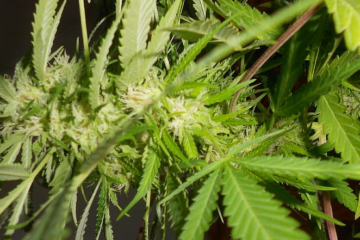A federal appeals court has once again struck down a controversial gun ownership ban for individuals who occasionally use marijuana, calling it unconstitutional. The U.S. Court of Appeals for the Fifth Circuit’s latest ruling overturns a prior conviction in the case of U.S. v. Daniels, marking a pivotal moment in the ongoing debate over cannabis, firearms, and constitutional rights.
A Conviction Reversed—Again
Patrick Daniels, the defendant in this landmark case, was convicted in 2022 under federal statute § 922(g)(3), which prohibits firearm possession by unlawful users of controlled substances. During a traffic stop, law enforcement found trace amounts of marijuana and firearms in his possession. Despite these findings, the appeals court found fault in the prosecution’s argument.
The Fifth Circuit’s ruling builds on earlier decisions, emphasizing that the government failed to demonstrate that Daniels was actively or regularly under the influence of cannabis when the firearms were discovered. The court concluded that the statute as applied to Daniels lacked historical precedent, a key consideration stemming from a U.S. Supreme Court ruling that such laws must align with historical firearm regulations.
In the words of the judges, “[T]he government’s burden of proof was too low, as it was not required to convince a jury that Daniels was presently or even regularly intoxicated at the time of arrest.”

Broader Implications of the Decision
This case is part of a growing trend of legal challenges to firearm bans linked to cannabis use. While some courts have upheld the bans, others, like the Fifth Circuit, have found them to be inconsistent with constitutional principles. The tension between state and federal laws has added layers of complexity to these cases, particularly as more states legalize cannabis.
Here’s what the ruling means in practical terms:
- Case-Specific Ruling: The Fifth Circuit clarified that this decision applies narrowly to Daniels’ case, leaving open the possibility of future prosecutions if stronger evidence is presented.
- Historical Analogues: The government’s inability to cite relevant historical laws supporting the disarming of cannabis users played a significant role in the court’s decision.
- Potential Reprosecution: The judges noted that the government could pursue Daniels again under a better-constructed argument, but his initial conviction did not meet constitutional standards.
A Growing Judicial Divide
Across the U.S., courts are grappling with similar cases, often reaching different conclusions. In one recent case in El Paso, Texas, a federal judge ruled that habitual marijuana users cannot be categorically banned from firearm ownership. The ruling allowed the defendant to withdraw a guilty plea and dismissed the charges against him.
Meanwhile, in a related case before the Tenth Circuit, judges have deliberated whether such bans constitute a violation of Second Amendment rights. The decision in that case could set additional precedent for the legality of disarming cannabis users.
The judicial divide reflects the broader cultural and political debate over cannabis legalization and gun rights. These cases raise important questions: Should occasional cannabis use disqualify someone from exercising their Second Amendment rights? And do such bans align with the nation’s legal traditions?
The Biden Administration’s Stance
The Justice Department (DOJ) has consistently defended the federal firearm ban for marijuana users, citing public safety concerns. DOJ lawyers argue that cannabis users are more likely to engage in unsafe behaviors, improperly store firearms, or pose a heightened risk of suicide. This stance has been central to their arguments in cases like U.S. v. Rahimi, which upheld firearm restrictions for individuals with domestic violence restraining orders.
Despite these claims, courts like the Fifth Circuit have expressed skepticism about whether cannabis use inherently makes someone “dangerous.” They point to a lack of evidence connecting occasional marijuana consumption to increased risks involving firearms.
The Road Ahead
This case underscores the growing friction between state legalization efforts and federal prohibition. With marijuana use now legal for medical or recreational purposes in 38 states, the federal government’s stance on cannabis and firearms is becoming increasingly difficult to enforce consistently.
Legal experts anticipate more challenges to § 922(g)(3) in the coming years, particularly as cases like U.S. v. Daniels continue to highlight its constitutional vulnerabilities. Whether Congress will act to reconcile these issues remains to be seen, but for now, courts are left to navigate this shifting landscape.
A Crossroads for Cannabis and Gun Rights
The intersection of cannabis legalization and gun rights remains a contentious legal battleground. As courts continue to weigh these cases, the outcomes will have significant implications for the millions of Americans who live in states where cannabis use is legal yet face federal restrictions on firearm ownership. For now, the Fifth Circuit’s ruling in U.S. v. Daniels marks a significant step in challenging these outdated statutes.



